_________________________________________________
Pollitecon Update
June 2025
________________________________________________
Sign
up to receive Updates
Many new books and some articles have been added to the Pollitecon
Free Ebooks Library and the website.
An Aussie In A Parallel Universe – Pollitecon's 16th Book
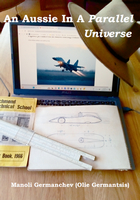 The
new book An Aussie In A Parallel Universe is full of entertaining and
insightful stories about an immigrant Macedonian boy discovering Australian
culture as he tries to fit in and find the "true blue Aussie". The interesting
anecdotes continue as he grows up and finds friendship, love and a career.
But his two universes remain parallel when he finds his calling as a
teacher, meets a wide range of other teachers, parents and students,
and discovers that inspiring students and young Aussies is not about
memorizing facts and figures but about involving them in practical and
sometimes extracurricular learning activities. The free ebook is Here.
The
new book An Aussie In A Parallel Universe is full of entertaining and
insightful stories about an immigrant Macedonian boy discovering Australian
culture as he tries to fit in and find the "true blue Aussie". The interesting
anecdotes continue as he grows up and finds friendship, love and a career.
But his two universes remain parallel when he finds his calling as a
teacher, meets a wide range of other teachers, parents and students,
and discovers that inspiring students and young Aussies is not about
memorizing facts and figures but about involving them in practical and
sometimes extracurricular learning activities. The free ebook is Here.
Macedonian Agenda now a Free Ebook
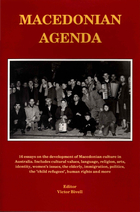 The
book Macedonian Agenda published by Pollitecon Publications is now available
as a free ebook in both PDF and html versions. The book is a collection
of 16 of the best essays on the development of Macedonian culture in
Australia. It includes cultural values, language, religion, arts, identity,
women's issues, the elderly, immigration, politics, the 'child refugees',
human rights and more. All of the writers are Australians of Macedonian
background. The 14 authors are 11 individuals and three organizations.
Among the individual authors are seven men and four women. The writers
come from all major Macedonian settlements around Australia: Perth,
Adelaide, Geelong, Melbourne, Canberra-Queanbeyan, Wollongong, Sydney
and Newcastle. They are also representative in that their origins are
in both the Republic of Macedonia and Aegean Macedonia (northern Greece).
Macedonian Agenda is suitable for general readers and researchers wishing
to learn about the Macedonians in Australia as well as for readers of
Macedonian background. The book is Here.
The
book Macedonian Agenda published by Pollitecon Publications is now available
as a free ebook in both PDF and html versions. The book is a collection
of 16 of the best essays on the development of Macedonian culture in
Australia. It includes cultural values, language, religion, arts, identity,
women's issues, the elderly, immigration, politics, the 'child refugees',
human rights and more. All of the writers are Australians of Macedonian
background. The 14 authors are 11 individuals and three organizations.
Among the individual authors are seven men and four women. The writers
come from all major Macedonian settlements around Australia: Perth,
Adelaide, Geelong, Melbourne, Canberra-Queanbeyan, Wollongong, Sydney
and Newcastle. They are also representative in that their origins are
in both the Republic of Macedonia and Aegean Macedonia (northern Greece).
Macedonian Agenda is suitable for general readers and researchers wishing
to learn about the Macedonians in Australia as well as for readers of
Macedonian background. The book is Here.
The Rising Sun In The Balkans: The Republic Of Macedonia Now Free
Online
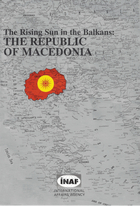 The
book The Rising Sun In The Balkans: The Republic Of Macedonia is now
available as a free ebook in both PDF and html formats. The book was
written by the International Affairs Agency, a Turkish based research
centre specializing in Balkan affairs. It was published by Pollitecon
in 1995 and having sold out was reprinted in 2014. The book examines
how Macedonia's international recognition was delayed by objections
from Greece regarding the use of the name Macedonia, the use of the
Macedonian Sun symbol, and Macedonia's Constitutional concerns for the
Macedonian minority in northern Greece. This book presents the arguments
of both countries and an objective, third party analysis. The positions
of the neighbouring countries, Bulgaria, Serbia and Albania, are also
outlined. Although Macedonia has since changed its formal name, the
many arguments that support Macedonia's chosen name, Republic of Macedonia,
are still relevant today. The ebook is Here.
The
book The Rising Sun In The Balkans: The Republic Of Macedonia is now
available as a free ebook in both PDF and html formats. The book was
written by the International Affairs Agency, a Turkish based research
centre specializing in Balkan affairs. It was published by Pollitecon
in 1995 and having sold out was reprinted in 2014. The book examines
how Macedonia's international recognition was delayed by objections
from Greece regarding the use of the name Macedonia, the use of the
Macedonian Sun symbol, and Macedonia's Constitutional concerns for the
Macedonian minority in northern Greece. This book presents the arguments
of both countries and an objective, third party analysis. The positions
of the neighbouring countries, Bulgaria, Serbia and Albania, are also
outlined. Although Macedonia has since changed its formal name, the
many arguments that support Macedonia's chosen name, Republic of Macedonia,
are still relevant today. The ebook is Here.
A Compilation of Testimonies by Ethnic Macedonians from Greece
 The
youtube video Ethnic Macedonians from Greece, Compilation of Testimonies,
Part 1 has been added to the Macedonian Genocide section of Pollitecon.
This excellent compilation features interviews with current residents
and refugees of Aegean Macedonia and their struggle for cultural and
national recognition by the Greek state. People interviewed include
high profile activists Pavle Filipov, Dimitar Jovanov, Risto Stefov,
Tome Miovski, Janko Kalinchev and many other well-spoken Macedonians
from a variety of Aegean cities and villages expressing their political
views and ethnic identities. There is also high quality footage of Aegean
Macedonia and recent political and cultural events. There are full English
subtitles. The video is Here.
The Macedonian Genocide page is Here.
The
youtube video Ethnic Macedonians from Greece, Compilation of Testimonies,
Part 1 has been added to the Macedonian Genocide section of Pollitecon.
This excellent compilation features interviews with current residents
and refugees of Aegean Macedonia and their struggle for cultural and
national recognition by the Greek state. People interviewed include
high profile activists Pavle Filipov, Dimitar Jovanov, Risto Stefov,
Tome Miovski, Janko Kalinchev and many other well-spoken Macedonians
from a variety of Aegean cities and villages expressing their political
views and ethnic identities. There is also high quality footage of Aegean
Macedonia and recent political and cultural events. There are full English
subtitles. The video is Here.
The Macedonian Genocide page is Here.
Proof That Napalm Was Used In The Greek Civil War
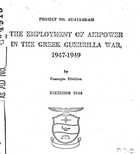 Proof
that napalm was used in the Greek Civil War and other interesting military
and social information comes from the report The Employment of Airpower
in the Greek Guerrilla War, 1947-1949 by the US' Aerospace Studies Institute
at Air University, Maxwell Air Force Base. The report also confirms
the cruel behaviour of the Greek Government towards its citizens, including
Macedonians. It says "But whatever the contributing factors – including
deep poverty - Rightist terror has been the primary recruiting agent
for the bands of the Left." The report says that "The Grammos operation
ended the last major guerrilla resistance in Greece." During this operation
the Greek airforce flew 826 sorties, and "dropped 288 tons of bombs,
expended 1,935 rockets and made 114 napalm strikes." The US provided
the napalm and training, Britain provided the Spitfire planes, and the
Greek airforce dropped the bombs. "Although limited use of napalm began
in the summer of 1948 , it was not until late 1948 that it began to
supplement other types of ordnance." The report also says that "Napalm
bombs were dropped on 5 August and, according to prisoner interrogations,
"they proved especially effective and terrifying"." The report is Here.
Proof
that napalm was used in the Greek Civil War and other interesting military
and social information comes from the report The Employment of Airpower
in the Greek Guerrilla War, 1947-1949 by the US' Aerospace Studies Institute
at Air University, Maxwell Air Force Base. The report also confirms
the cruel behaviour of the Greek Government towards its citizens, including
Macedonians. It says "But whatever the contributing factors – including
deep poverty - Rightist terror has been the primary recruiting agent
for the bands of the Left." The report says that "The Grammos operation
ended the last major guerrilla resistance in Greece." During this operation
the Greek airforce flew 826 sorties, and "dropped 288 tons of bombs,
expended 1,935 rockets and made 114 napalm strikes." The US provided
the napalm and training, Britain provided the Spitfire planes, and the
Greek airforce dropped the bombs. "Although limited use of napalm began
in the summer of 1948 , it was not until late 1948 that it began to
supplement other types of ordnance." The report also says that "Napalm
bombs were dropped on 5 August and, according to prisoner interrogations,
"they proved especially effective and terrifying"." The report is Here.
Little Aid Given Exiles By Greece – Macedonians Driven Out Of Homes
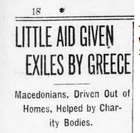 Some
of the inhumane cruelty that Greece inflicted on Macedonians who were
part of the massive ethnic cleansing and population exchanges between
Greece and Bulgaria in the 1920s is reported in the article Little Aid
Given Exiles By Greece – Macedonians Driven Out Of Homes. Among other
matters the article discusses how the Macedonians were "despoiled of
homes and property to make room for the Greeks" and how this often led
to trouble between the native cultivators and the incoming settlers
from Turkey. The article says "Greece's program is to Hellenize Macedonia
by driving out the Macedonians." The article was the fifth in a series
on the Balkan population exchanges. It was written by Junius B. Wood
and published in the Evening Star newspaper in Washington, 16 August
1925. The article is in Pollitecon's Macedonian Genocide page under
the section on The Greek Invasion of Turkey and the Colonization of
Macedonia, or it can be downloaded Here.
The Macedonian Genocide page is Here.
Some
of the inhumane cruelty that Greece inflicted on Macedonians who were
part of the massive ethnic cleansing and population exchanges between
Greece and Bulgaria in the 1920s is reported in the article Little Aid
Given Exiles By Greece – Macedonians Driven Out Of Homes. Among other
matters the article discusses how the Macedonians were "despoiled of
homes and property to make room for the Greeks" and how this often led
to trouble between the native cultivators and the incoming settlers
from Turkey. The article says "Greece's program is to Hellenize Macedonia
by driving out the Macedonians." The article was the fifth in a series
on the Balkan population exchanges. It was written by Junius B. Wood
and published in the Evening Star newspaper in Washington, 16 August
1925. The article is in Pollitecon's Macedonian Genocide page under
the section on The Greek Invasion of Turkey and the Colonization of
Macedonia, or it can be downloaded Here.
The Macedonian Genocide page is Here.
Thousands of Photos and Hundreds of Videos from the Greek Civil
War
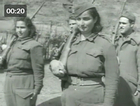 A
link to over 4,000 photos from the Greek Civil War and another link
to over 300 videos from the War have been added to Pollitecon's Macedonian
Genocide page. The photos and videos are hosted by Getty Images. Although
the material appears to be mainly from the US, British and Greek perspective,
the high quality images give an excellent feel for the people, landscape
and the military equipment and military actions of the war. The people
include villagers, soldiers and historical figures. The photos are Here.
The videos are Here.
A
link to over 4,000 photos from the Greek Civil War and another link
to over 300 videos from the War have been added to Pollitecon's Macedonian
Genocide page. The photos and videos are hosted by Getty Images. Although
the material appears to be mainly from the US, British and Greek perspective,
the high quality images give an excellent feel for the people, landscape
and the military equipment and military actions of the war. The people
include villagers, soldiers and historical figures. The photos are Here.
The videos are Here.
Makronissos Digital Museum
 A
link to the Makronissos Digital Museum has been added to the Macedonian
Genocide page. Makronissos, an island near Athens, was a large and notorious
Greek prison camp where political prisoners, communists, and those suspected
of being leftists and anti-government were held, tortured and forcefully
‘rehabilitated' during and after the Greek Civil War. The Digital Museum
captures much of this with large collections of photographs, archival
documents, and information on tortures and psychological violence, the
poor living conditions, deaths, the declarations of repentance, propaganda,
art, and some of the names of the tens of thousands of prisoners. Although
the Archive does not appear to acknowledge and record the many thousands
of Macedonians who were held there, it still provides insights into
one of Greece's largest and most notorious prison camps. The Makronissos
Digital Museum is Here.
The Macedonian Genocide page is Here.
A
link to the Makronissos Digital Museum has been added to the Macedonian
Genocide page. Makronissos, an island near Athens, was a large and notorious
Greek prison camp where political prisoners, communists, and those suspected
of being leftists and anti-government were held, tortured and forcefully
‘rehabilitated' during and after the Greek Civil War. The Digital Museum
captures much of this with large collections of photographs, archival
documents, and information on tortures and psychological violence, the
poor living conditions, deaths, the declarations of repentance, propaganda,
art, and some of the names of the tens of thousands of prisoners. Although
the Archive does not appear to acknowledge and record the many thousands
of Macedonians who were held there, it still provides insights into
one of Greece's largest and most notorious prison camps. The Makronissos
Digital Museum is Here.
The Macedonian Genocide page is Here.
Interview by Silvana Pavlovska with Sasha Uzunov and Victor Bivell
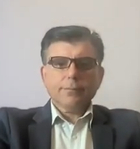 An
interview conducted by Silvana Pavlovska with journalist Sasha Uzunov
and Pollitecon publisher Victor Bivell covers a range of political issues.
These include the unfair machinations and consequences of the Prespa
Agreement; the difficulties that some Macedonians have in entering Greece;
issues around the visit to Australia of Macedonia's current foreign
minister from VMRO, particularly after the previous SDSM government
ignored Australia for many years; Macedonia's relationship with the
US including its support for Albanian extremists in Macedonia, and opportunities
for influence and change in Macedonia by the diaspora. The interview
is Here.
An
interview conducted by Silvana Pavlovska with journalist Sasha Uzunov
and Pollitecon publisher Victor Bivell covers a range of political issues.
These include the unfair machinations and consequences of the Prespa
Agreement; the difficulties that some Macedonians have in entering Greece;
issues around the visit to Australia of Macedonia's current foreign
minister from VMRO, particularly after the previous SDSM government
ignored Australia for many years; Macedonia's relationship with the
US including its support for Albanian extremists in Macedonia, and opportunities
for influence and change in Macedonia by the diaspora. The interview
is Here.
Prilepskiot Govor
The book Prilepskiot Govor by Blazhe Koneski opens with a section on
phonetics that uses the Prilep dialect to help show the historical development
of the spoken Macedonian language. Key aspects of the Prilep dialect
that are discussed include vowels, consonants, nouns, verbs, word and
speech structure, the accent, gender and many other speech characteristics.
There are also letters and excerpts from letters presented as written
examples of the dialect. The book is Here.
Books by Other Publishers
Macedonia: A History
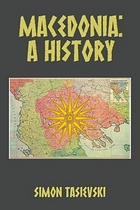 Macedonia:
A History by Simon Tasievski challenges and refutes many of the misconceptions
and mistruths spread by Greek propagandists about Macedonia and Macedonia.
The author does this with research and quotes from a long list of ancient
and modern historians and authors, including Greek sources. These are
presented in an easy-to-read format. Topics discussed include whether
the Macedonians were Greek, the theory of mass Slav migration into Macedonia,
the Byzantine period, the annexation and assimilation of Aegean Macedonia,
the one sided "name dispute", the biblical references to Macedonia,
and 19th century newspaper references to Macedonia, among others. Macedonia:
A History is available in both paperback and ebook formats and in 7
languages including English, Macedonian and Greek. The English version
can be purchased at amazon.com Here.
Macedonia:
A History by Simon Tasievski challenges and refutes many of the misconceptions
and mistruths spread by Greek propagandists about Macedonia and Macedonia.
The author does this with research and quotes from a long list of ancient
and modern historians and authors, including Greek sources. These are
presented in an easy-to-read format. Topics discussed include whether
the Macedonians were Greek, the theory of mass Slav migration into Macedonia,
the Byzantine period, the annexation and assimilation of Aegean Macedonia,
the one sided "name dispute", the biblical references to Macedonia,
and 19th century newspaper references to Macedonia, among others. Macedonia:
A History is available in both paperback and ebook formats and in 7
languages including English, Macedonian and Greek. The English version
can be purchased at amazon.com Here.
More Free Ebooks
There are now over 500 free ebooks in The
Pollitecon Free Ebooks Library.
Macedonia Needs Macedonians

Please remember that Macedonia Needs Macedonians. The Facebook page
for the Macedonia Needs Macedonians group is Here.
Two major tourism portals are Travel2Macedonia which is Here,
and Macedonia - Timeless which is Here.
Canadian Macedonian Books
 A
reminder that Canadian Macedonian Books has a great selection of Macedonian
books in English from around the world. These include non-fiction, fiction,
children's and cook books. Canadian Macedonian Books is run by Virginia
Evans, a former co-president of the Canadian Macedonian Historical Society
and founder of the Macedonian Film Festival in Toronto. Canadian Macedonian
Books is Here.
A
reminder that Canadian Macedonian Books has a great selection of Macedonian
books in English from around the world. These include non-fiction, fiction,
children's and cook books. Canadian Macedonian Books is run by Virginia
Evans, a former co-president of the Canadian Macedonian Historical Society
and founder of the Macedonian Film Festival in Toronto. Canadian Macedonian
Books is Here.
Sign
up to receive Pollitecon Updates
Thank you
Victor Bivell
Pollitecon Publications
PO Box 3411
Wareemba NSW 2046 Australia
Email vbivell @ pollitecon.com
Web http://www.pollitecon.com
More Updates

